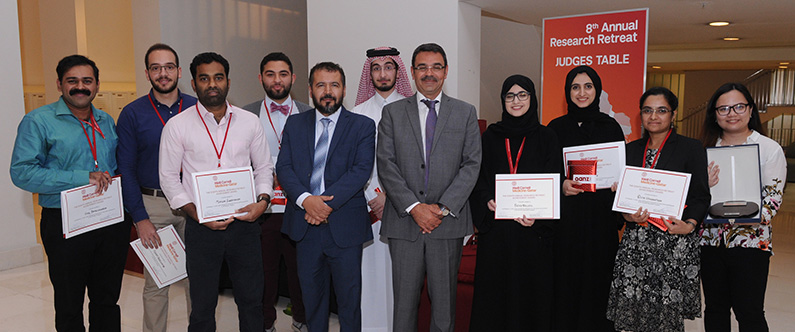Annual Research Retreat at WCM-Q
 Dr. Nayef Mazloum and Dr. Khaled Machaca (center) with the winners of the poster presentations.
Dr. Nayef Mazloum and Dr. Khaled Machaca (center) with the winners of the poster presentations.
Hundreds of scientists from across the country and around the world visited Weill Cornell Medicine - Qatar (WCM-Q) to attend its Annual Research Retreat.
The yearly event is an opportunity to review the college’s biomedical research in collaboration with local stakeholders over the previous 12 months, hear about upcoming studies and discuss new developments in the realm of biomedical research.
The event was opened by Dr. Khaled Machaca, associate dean for research at WCM-Q, who gave delegates a brief history of the college’s biomedical research program, which is under the sponsorship of Qatar Foundation. Since its launch nine years ago, Dr. Machaca said that scientists at WCM-Q have published over 800 publications, which have garnered over 16,000 citations attesting to the impactful and internationally visible science undertaken in WCMQ laboratories in Qatar. Dr. Machaca said the college was involved in several high-profile national collaborations - including with Hamad Medical Corporation, Qatar BioBank, Qatar Genome Project and Sidra Medicine to name a few - but there were new challenges ahead.
Dr. Machaca said: “How do we translate this research into improved healthcare with an economic impact, while maintaining our basic research discovery plan? A possible solution could be a national collaborative approach towards this issue on which the government, funding bodies and research institutes work together.”
Dr. Machaca went on to thank Qatar Foundation and Qatar National Research Fund for their unwavering support over the years and their continued backing of the mission to create a knowledge-based economy.
The audience also heard from keynote speaker Dr. Robert Ruffolo, retired president of research and development for Wyeth Pharmaceuticals in the US, whose speech was entitled ‘An overview of research and development in the pharmaceutical industry: A most unique industry’.

Dr. Ruffolo argued for a different business model for the global pharmaceutical industry, as the current one is unsustainable.
Dr. Ruffolo explained that the pharmaceutical industry is by far the biggest primary source of new drugs across the world and that because of the huge costs involved in bringing a drug to market and the length of time involved - which can be as long as 16 years – companies have to take huge risks; if a drug falls at the final hurdle then vast amounts of time and money are wasted.
But major pharmaceutical companies are vital for ensuring new drugs come to the market. By way of comparison, Dr. Ruffolo said his former company had a $4billion biomedical research and development budget while the United Kingdom only has a $1billion annual budget. He argued for a model of much closer collaborative ties between universities like WCM-Q, biotechnology companies and ‘big pharma’ to better advance drug development in the future.
The Annual Research Retreat was also an opportunity for WCM-Q’s scientists to showcase their work to the scientific community, and eight of the senior researchers gave short presentations of their studies. The highlight of the event, though, was the poster presentations, when 120 of the researchers presented their work in poster form. These were judged by a team of experts from WCM-Q and partner institutions, and the winners announced at the end of the day.

In the student category the winners were: Joint first, Sulaiman Al-Shakhs with the poster Inhibition of the CD33 Pathway as a Novel Strategy to Alleviate Alzheimer’s Disease Neuropathological, and Hisham Abdelwahab with AAV-mediated anti-Notch1 Antibody Expression to treat Glioblastoma Multiforme; second was Nada Darwish with Regulation of integrin linked kinase by calreticulin as a mechanism for cancer development and metastasis; and third Abdulla Al Mulla with the poster Dysregulation in crp, tnf-alpha and il-6 markers associated with obese bipolar patients.
In the research specialist category Ayeda Ahmed was first with her research poster Characterization of genomic alterations and TCRß repertoire of tumor-infiltrating lymphocytes in breast cancer; second was Divya Vishwanathan and the poster Endoplasmic reticulum stress enhances the rate of endocytosis in calreticulin knock out cells; and third was Raja’a Dalloul with Vascular endothelial dysfunction as the mechanism for the development of obesity.
In the postdoctoral category, first was Vimal Ramachandran with the poster A microRNA-based strategy to combat hypercholesterolemia; and joint second were Murugan Subramanian with A microRNA-dependent pathway regulating ER stress-induced lipogenesis via mTOR in liver; and Yasser Majeed with Functional interaction between Sirt1 deacetylase and Myc oncogene regulates adipogenesis.
Commenting on the great advancements made over the last year in research, Dr. Javaid Sheikh, Dean of Weill Cornell Medicine-Qatar said: “The productivity and impact of our research program over the past decade have been monumental, both in terms of scientific impact and capacity-building nationally. In the very short span of nine years - extremely short in the biomedical research world - WCM-Q went from having no research footprint to establishing one of the premier biomedical research programs in the region, thanks to the continued support of Qatar Foundation and the dedication of our researchers.”